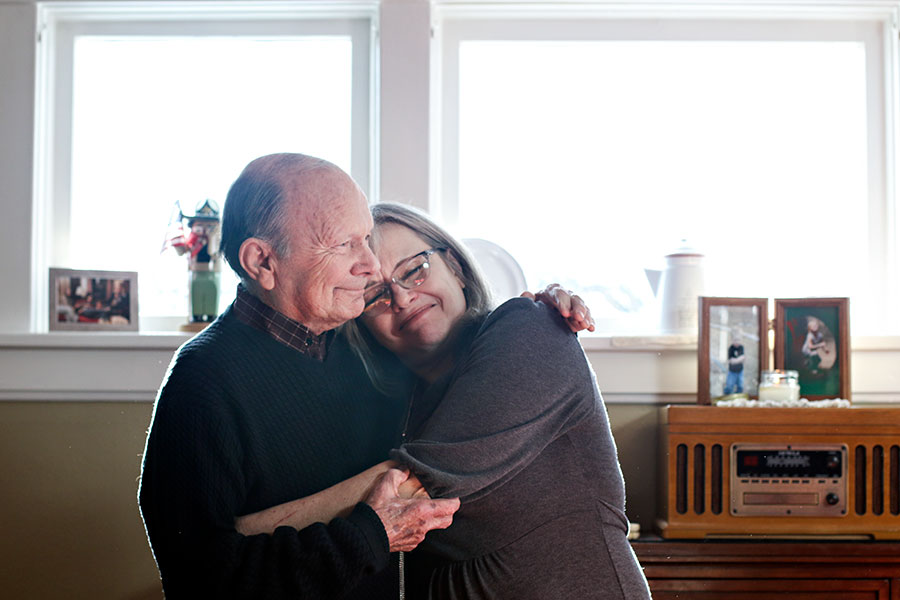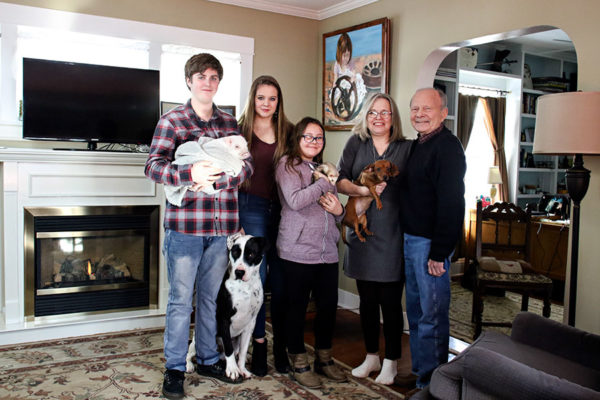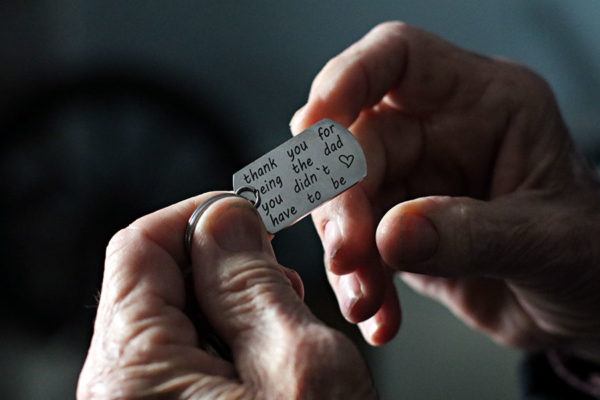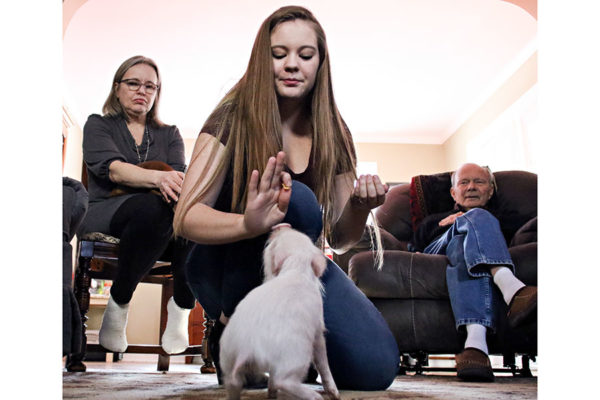The Changing Nature of Grandparenting
As more grandparents raise their grandchildren, they face unforeseen financial strain, uncertainty about support services, and health issues that arise with aging, but they aren’t alone
By Molly Priddy
To know Jacqueline and Stephen Elm is to know them not by those names, but instead by the ones used by those who love them: Nana and grandpa.
In their home on Kalispell’s northeast side, warmth spills from the fireplace and from the way they engage with their family, made up now of three of their grandchildren and a cadre of friendly animal companions, as well as a teenager who didn’t have anywhere to go.
“Family is your biggest asset,” Jacqueline said, sitting in the living room with the grandkids she and Stephen are raising. “I don’t think any one person can fulfill everything in our lives.”
The Elms have 23 grandchildren all together, and they’ve been raising Ella, 11, Fury, 16, and Caleb, 19, since the kids were small. It was an unexpected twist in their lives, the Elms said, and it’s been one full of love, challenges, upset, and eventually, a hard-earned peace.
“You don’t see this coming,” Jacqueline said. “We have invested every cent into raising these kids. This is our retirement. The rest of my life is devoted to this, to finish raising these kids and making it better for other people doing the same.”

The Elms’ situation isn’t a rarity.
Across the country, more grandparents are raising their grandchildren and grappling with what that means in a world where we live longer and many haven’t prepared financially to start raising kids again in their twilight years.
It’s an issue that crosses all socioeconomic boundaries, affecting grandparents of all kinds. Nationwide, more than 437,000 children were in foster care in 2016. The opiate crisis has helped increase the number of children in foster care due to substance-abuse disorders to more than 258,000, and of those kids, a third live with relatives. It’s a jump of 4.6 percent in 10 years, from 2006 to 2016.
In Montana, more than 16,000 children live with relatives, and of these, 13,385 live with their grandparents, according to the Grandfamilies organization, which works with Generations United, the Brookdale Foundation Group, AARP, and other programs to study this issue.
More than 7,500 grandparents in Montana are responsible for their grandchildren, and in at least 42 percent of the cases, the children’s parents are not present. These numbers are probably low, given the number of grandparents raising their grandchildren outside of the child services system who are uncounted.
Sandra Bailey, a family and human development extension agent with Montana State University, founded the Grandparents Raising Grandchildren Project in 2002 to study how this affects Montanans and how to effectively support them. The program is now called the Montana Kinship Navigator Program to account for all types of family members raising kids.
“I kept hearing about grandparents raising grandchildren. Over and over I was hearing about it. That got me doing some searching with my colleagues in other states and also we connected with AARP at the time. We were hearing that it was a bigger and bigger issue,” Bailey said.
She started her work at the tail end of the meth epidemic of the 1990s, which led to a high number of children in foster and kinship care the same way opiates are now. But substance abuse issues aren’t the sole cause of this phenomenon, Bailey said.
“We did one study where we asked what was the primary reason, and the grandparents said, ‘We can’t give you a primary reason.’ It could be substance abuse, it could be mental health issues, physical health issues, teen pregnancy, finances, someone being incarcerated in jail or prison, and more,” Bailey said.
These issues often overlap and intermingle, inflaming one another. One major trend Bailey saw was how it affected grandparents of all sorts, cutting across all racial and ethnic groups and socioeconomic statuses.
School administrators in the Flathead echoed Bailey’s sentiments. Mark Flatau, superintendent for Kalispell School District 5, said he’s seen more grandparents raising their grandchildren and that the school district does what it can to work with anyone willing to make a child’s life better.
“From our position, whether it’s the mother and father of birth, whether it’s a stepmother, whatever the combination is, we’re going to work with those families regardless. It’s best for the child, the student,” Flatau said. “With that said, you know that when a grandparent is raising a grandchild, there’s probably some sort of potential trauma or issues that that child has had to go through.”
Laurie Barron, superintendent of Evergreen School District 50, said the goal at Evergreen schools is to support the students regardless of diverse family dynamics.
“Our goal is to serve the student no matter who brings them or who they are. We’re all about serving the kids every day and getting the kids to their highest capabilities,” Barron said. “We treat every student regardless of the dynamics of the family with as many support services as possible.”
Both school districts reported similar percentages of students being raised by their grandparents; in Kalispell, 87 of the 6,000 students have grandparents listed as the primary household, or about 1.5 percent. In Evergreen, it was 19 of the 730 students, or about 2.5 percent. But these numbers are likely low, Flatau said, because it comes down to self-reporting.
“It’s a significant number,” Flatau said. “In every one of our schools, it’s common now for a grandparent to come in for a parent-teacher conference.”
In Columbia Falls, Superintendent Steve Bradshaw said he’s seen more grandparents raising grandkids in the last 10 years than the previous 30-plus of his career.
“We as a school district try to work with any grandparent who is signed up as the guardian,” Bradshaw said. “Sometimes we get in trouble because we can’t give the information the grandparent would love to have because they’re not assigned as the legal guardian. For the most part, I’ve seen grandparents who are having a tremendously positive impact on their grandchildren.”
For the Elm family, Jacqueline knew she had to step in when her daughter, Heather, struggled with an opiate addiction while raising her two young children, Fury and Caleb, who were only toddlers at the time.
It was as natural as breathing to take the kids, Jacqueline said, but it was also a challenge. There was uncertainty over whether she would get to keep the kids, if either of the parents decided to come back into the picture. When she took in Ella, Jacqueline said she faced difficulties from the state’s Child and Family Services Division, because grandparents often don’t have the same protections and rights as foster families or legal guardians.
The best way to handle the situation, she decided, was to work with all the people involved, to communicate and develop better relationships with the parents so the kids could reap the benefits.
About 15 years ago, around the time she took in the first two grandbabies, Jacqueline, 59, met Stephen Elm. Both were in a Whitefish Theatre Company production of “Guys and Dolls,” and partnered up for a rehearsal exercise.
“I was a carefree bachelor minding my own business,” Stephen, 75, said. “My kids were already grown, in their 40s.”
When they partnered up for that rehearsal, something deep and true clicked.
“I didn’t realize it was going to be for life, and I’ve never regretted a moment,” Stephen said, his eyes beginning to tear up.
They married and continued raising the children. They began encountering other grandparents in their position, many of whom believed they were alone and felt isolated in their situations. The Elms decided they wanted to help these folks, and in 2015 started the nonprofit Grandfamilies of Montana.
The group helps connect grandparents, provide support, and lobby for changing the laws to benefit grandparents raising grandkids. One example would be the Family First Prevention Services Act, which President Donald Trump signed into law last February. The law redirects federal funds to services that keep children with their families, and if they need to go into foster care, it allows federal reimbursement for care in family-based settings.
Jacqueline wanted to be in a better position to help change the status quo with her Grandfamilies group, so she decided to pursue her bachelor’s degree in social work at Flathead Valley Community College, with a focus on addiction.
She’s proud to say she’ll graduate in May, but it’s bittersweet. Stephen, a retired Air Force fighter pilot who served in the Vietnam War and was exposed to Agent Orange, is ill and his health is declining. His goal is to make it long enough to see her walk across the stage and receive her degree, Jacqueline said.

Americans are living longer, and with extended life comes new challenges.
Lisa Sheppard, director of the Flathead County Agency on Aging, said living longer means people’s retirement funds are expected to last until they’re in their 90s or even 100 years old. She said it’s not uncommon for people in their 70s to be caring for parents in their 90s, but many don’t know there are other caregivers doing the same.
“Caregivers are hidden and isolated by the very nature of their caregiving,” Sheppard said.
This isolation also has roots in the stigma some feel about asking for help, she said.
“People want to be able to care for their loved ones, and they don’t want to ask for help, and other people in this situation don’t know where to go for help,” Sheppard said.
According to U.S. Census estimates, there were 970 households in Flathead County with grandchildren under the age of 18 living with a grandparent householder in 2017. Of those, 482 were households of grandparents solely responsible for the kids, and 211 had a parent present.
Aging comes with its own struggles: Our bodies naturally start to wear out, and the probability of health problems becomes much higher after we turn 75. Sheppard discussed a case in the county of a couple in their 90s raising a great-grandson while trying to take care of each other at the same time, and how it has drained them financially, physically, and emotionally.
The Agency on Aging wants to help, Sheppard said.
Seniors can go there and receive a free benefits checkup, where staff works with them to determine which programs and services they qualify for to help shoulder some of the financial burden. There are services specifically for grandparents raising their grandchildren — such as grandchildren receiving full Medicaid benefits regardless of the grandparents’ income — and programs to support seniors in general.
Some people, especially in older generations, don’t feel as though they deserve these services, Sheppard said, or that they’re taking services from people who really need them, or taking money that would otherwise be spent on their grandchildren.
Sheppard understands, and encourages all seniors to get in touch because since they’ve paid their taxes all their lives, they’re the ones who paid to build these programs from the ground up.
“You gave, now save,” Sheppard said. “And doing that for yourself helps the people you’re caring for.”
About a third of the seniors in the valley are living solely on Social Security benefits, Sheppard said.
“People don’t understand how desperately people need assistance that makes their money go farther,” she said. “We don’t prepare to live to 100.”
Health care costs and prescription drug costs are high, and the cost of living keeps increasing. Skilled nursing care tends to be expensive and isn’t accessible to everyone. Couple these issues with the costs of raising children in today’s world, and there’s a perfect storm brewing, Sheppard said.
“If people find themselves caregiving, please give us a call at (406) 758-5730,” Sheppard said.

Jacqueline doesn’t know if there’s a time during her day when she’s not caring for someone, whether it’s making sure the grandkids are on track or that Stephen is receiving the care he needs.
She’s leaned into the caregiver role, expanding her care to those within the Grandfamilies of Montana organization as well. It’s taken years of work, but her family is together and getting along for the kids’ sake. Her daughter, Heather, has overcome her opiate addiction and is doing wonderfully, Jacqueline said, and is a great mom to her other children.
“We have built these wonderful relationships with everyone to get everyone where they can all be together and the kids have a blast,” she said. “There’s a way we can do this and keep the families together and take care of these kids.”
The couple chose their house in Kalispell based on how many people could stay there comfortably. Each child has at least one pet to care for, and Fury in particular has a penchant for training these creatures. She’s trained her mini pig Bubbles to spin and give kisses and high fives, and the dogs in the house know German obedience phrases. Ella enjoys her ferret, Anna, and Stephen is particularly taken with Mini, the dachshund-Chihuahua mix Jacqueline found for him after he got sick.
It’s not the life either of them expected to have in their older years, but then again, life rarely turns out how we plan it.
“So often we consider the other places we could be in life,” Jacqueline said. “But we couldn’t live with ourselves.”
“Once I became aware of how many young people are adrift, I started to recognize a huge need in the country and the deplorable state of traditional services,” Stephen said.
Family can mean many things. In the Elm household, family is chaos and goofiness. It’s safety, according to Stephen, someone being there for you. Ella believes it means someone loving you, and everyone loving each other, and Trenton, the teenager the Elms recently took in, believes it doesn’t have to mean blood relatives.
This isn’t to say they won’t face challenges or experience setbacks as a family and as individuals, but they’re dedicated to one another and plan to face those situations head on, together.
“I love it here, honestly,” Fury said.
“Yeah,” Ella echoed, “it’s amazing.”